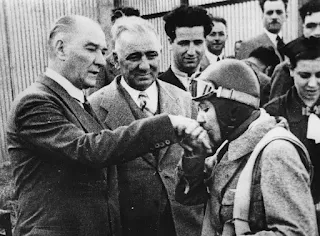One thing I have noticed over the years is that there are some of our activities that reaffirm our propensity towards herd mentality. One is our appreciation of haute culture. Just because a movie star is seen wearing a transparent tunic which does not leave anything to the imagination of lies beneath (her undergarment or therein lack of), everyone wants a piece of the action.
In 1976, Steven Spurrier, a British merchant who sold only French wine, had a blind wine tasting competition in Paris; involving French and Californian wines. The Californian wine industry was considered a Lilliputian in contrast to their French counterparts. Hence, it was unwelcomed results when the creme de la crème of France's oenophiles turned in the Americans as the winner. The organisers were so embarrassed by the outcome that they suppressed the news from the French public. A lone reporter from the Time magazine leaked out the information to the world of what was later to the 'Judgement of Paris' in reference to the Greek mythology. In the Iliad, Paris was appointed as a judge to a beauty contest involving three Goddesses - Hera, Athena and Aphrodite. The best candidate did not win as Paris was he bribed by Aphrodite.
Some people take great pleasure in their vintage wines and spirits. It has become a fashion statement of sorts amongst the high societies to serve single malt whisky of a particular age which boasts of a specific amount of character and complexity from the cask. Guests would all nod in unison after the first sip. I wonder if they would still be able to discern the difference if the liquor was unceremonious replaced with a younger whisky or for that matter a blended one, after their third or fourth drink.
Lately, Malaysians were pleasantly surprised to learn that a Malaysian-made blended whiskey had won a silver medal at the 2020 San Francisco World Spirits Competition. Pleasant because we are always trying to find accreditation outside to convince ourselves that we are doing alright. Surprised because no one knew that we were brewing whiskey in this country, with the new wave of religiosity creeping in and all.
Speedy went on to be a mercenary to provide Indian troops to squash the Larut clash between Ghee Hin and Hai San gangs. He went on to become the assistant to JWW Birch, the first British Resident of Perak. He was instrumental in the development of Taiping town.
Later, he and his Mrs went on to explore and live in Sudan. 


The point to note is that it is spelt 'whiskey' not 'whisky'. Whisky is sort of patented for whiskies brewed in Scotland, much like whiskies from America are bourbon. Elsewhere, it is just whiskey for you.
Timah is here and is selling faster than you can google them. The packaging honours a certain Captain Speedy who had served the British East India Company well. I was perplexed. Even though I cannot claim to know the Malayan history in and out, a famous figure that deserves recognition for a Malaysian product ought to tickle my brain cells, I thought.
A little search and there, I discovered that Tristram Charles Sawyer Speedy a.k.a Captain Speedy was quite a flamboyant character who led an illustrious life. Born in Meerut, India, to a family with army traditions, he was trained as a soldier in England. He returned to India as an Army Officer and went on to serve in the Northern Frontier Province and Ethiopia. In 1871, he was summoned to Penang as the Superintendant of Police. He must have been quite a character for getting quite a caustic remark from the then Governor of the Straits Settlement.
 |
Journal of the Malayan Branch of the Royal Asiatic Society
Vol. 26, No. 3 (163), Captain Speedy of Larut (Nov 1953, pp 3-103).
|

(P.S. 'Timah' is tin (Stanum, Sn, atomic number 50 on the periodic chart, in the Malay language. Tin brought in Chinese immigration and an excellent opportune for British meddling of Malayan affairs. Chinese immigration also brought in the triad, namely Ghi Hin and Hai San. Originating from different part of China with different dialects, Cantonese and Hakka respectively, each wanted the stronghold of the mining business. Caught in the middle are the local chieftains who also wanted to collect levy (without working!). The chiefs turned to the British for mediation. Speedy, the maverick, who by then had resigned as the Superintendent of Police of Penang, was roped in the squash the disturbance. Speedy brought in Indian soldiers for that purpose and billed the Malay chief handsomely).
That is Tin (Timah) and Speedy are linked.
 |
| The bungalow in Matang lived by Speedy. |


Vol. 26, No. 3 (163), Captain Speedy of Larut (November 1953), pp. 3-103 (107 pages)



















